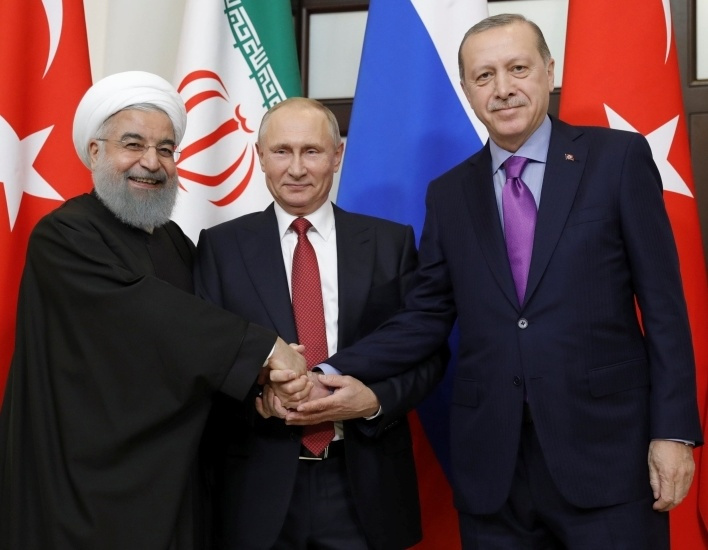Tehran Summit: Will Syria and sanctions bring Iran, Turkey and Russia closer?

Iranian President Hassan Rouhani will meet his Russian and Turkish counterparts, Vladimir Putin and Recep Erdogan, in a summit in Tehran on Friday to discuss the developments in Syria. Several summits between the three heads of state have been convened during the past couple of years in order to develop a diplomatic solution to the war in Syria. As the Syrian Army is preparing to wrest the northern city of Idlib off terrorist groups, Iranian Diplomacy has discussed the significance of this trilateral meeting with Mahmoud Shouri, Middle East affairs expert:
IRD: Another round of trilateral talks between the presidents of Iran, Turkey and Russia will be held in Tehran on September 7th. Regarding the ongoing regional developments, and also the tense relations between the three parties to the summit on the one hand and the United States on the other hand, what is your prediction about the proceedings and outcome of the summit?
MS: The Iran-Russia-Turkey trilateral meeting is part of a diplomatic and political framework that is held in parallel with the Astana talks which aims to find a political solution to the Syrian crisis. The previous meetings have brought positive impacts to the Syrian crisis. The Astana process which was convened by these three countries has created a space for dialogue and consensus between Syrian groups. We also have the randomly held Geneva talks which so far has failed to be as fruitful as Astana talks.
Despite their serious differences at the beginning of the Syrian crisis, Iran and Russia on the one hand, and Turkey on the other hand, they have gradually patched up those differences and reached a sort of consensus, which indicates political maturity among regional actors and a proof that regional crises can be solved without intervention by powers outside the region. The case of Idlib has made the situation in Syria more complex and sensitive however. So the upcoming talks can be an opportunity to find a solution for this case and put an end to the Syrian crisis.
On the other hand, the three countries face another common challenge which is the US sanctions. The problem can bring them closer and likely negotiations can generate a collective solution that helps withstand US pressures and mitigate the impact of sanctions. For these reasons, the upcoming summit is important.
IRD: How do you see Turkey’s policy shift and its designation of Jabhat al-Nusra as a terrorist group before the Tehran summit? As you know, Idlib is now the hotspot of the Syrian war and al-Nusra front gained control of the Idlib Province with strong support from Ankara. Do you think this is part of Ankara’s tradeoff with Tehran or Moscow?
MS: With field developments in the Syrian war, Turkey has also redefined its approach. Erdogan has proved his pragmatic attitude before, so designation of the al-Nusra Front as a terrorist group by Ankara should not surprise us. Turkey sees no more benefits in supporting such terrorist groups, so the situation is conducive to negotiation of a solution between Tehran, Moscow and Ankara. Turkey's decision means al-Nusra will be discarded from field developments in Syria, and Damascus can move forward to retake Idlib without any obstructions from the Turkish side.
IRD: All three countries, Turkey, Russia, Iran, have seen Washington impose unilateral sanctions against them. Do you think sanctions will be on the agenda of Tehran Summit?
MS: They will probably discuss the sanctions. Iran has been negotiating with Russia and Turkey for some time now to carry out bilateral trade in national currencies. So banking workgroups of the three countries can be involved in talks in order to cut off dollar from bilateral trade. US sanctions against the three countries will speed up the talks. However, this will not happen overnight and needs careful planning and time. There is also the danger of being stuck in formalities, that is, the summits turn into a ritual with little practical impact.
IRD: There are also worries that with US secondary sanctions, Russia and Turkey may only pay lip service to Iran and take no real action. How do you see the chances?
MS: In every diplomatic interaction each party seeks its own interests. So Tehran should use persuasive force to bring Ankara and Moscow on board and gain their support against sanctions. We should rely on the negotiating skills of our diplomatic apparatus, and not merely tie our hopes to Moscow and Ankara.
* This piece was originally published in Iranian Diplomacy Persian.

